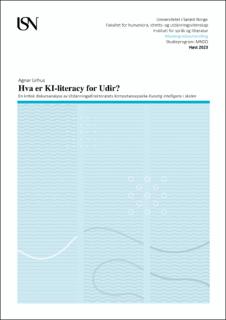| dc.contributor.advisor | Askeland, Norunn | |
| dc.contributor.advisor | Oddvik, Morten | |
| dc.contributor.author | Lirhus, Agnar | |
| dc.date.accessioned | 2024-02-01T17:41:29Z | |
| dc.date.available | 2024-02-01T17:41:29Z | |
| dc.date.issued | 2023 | |
| dc.identifier | no.usn:wiseflow:6963329:56426496 | |
| dc.identifier.uri | https://hdl.handle.net/11250/3115141 | |
| dc.description.abstract | Siden ChatGPT slo ned som lyn fra klar himmel 30. november 2022, har generative språkmodeller vært på agendaen i norsk skole. Masteroppgaven analyserer Udirs kompetansepakke Kunstig intelligens i skolen for å forstå hvordan Udir oppfatter og formidler begrepet KI-literacy gjennom utformingen av kompetansepakken, da Udir selv oppgir KI-literacy som en viktig kompetanse. Analysemetoden er kritisk diskursanalyse, herunder Faircloughs tretrinnsmodell. Problemstillingen er: Hva slags forståelse av KI-literacy finner vi i Udirs kompetansepakke Kunstig intelligens i skolen?
Analysen forfølger fire forskningsspørsmål. For det første undersøkes språkbruken i kompetansepakken. Derpå analyseres multimodale komposisjonsprinsipper. Videre analyseres sammensetningen av aktører. Til sist undersøkes det om funnene i de foregående analyseperspektivene blir reprodusert i oppdateringen av kompetansepakken av august 2023. Sentrale funn i analysen er at begreper som personvern og datasikkerhet omtales på en vag og uforpliktende måte, mens informasjon om bruk av KI-verktøy er mer konkret og aktiviserende. Kompetansepakken har også en tendens til å plassere «negativ» kunnskap om KI-teknologi på perifere steder, gjerne nederst på siden eller skjult i nedtrekksfaner, mens «positiv» kunnskap får en fremtredende plass. Antropomorfisering er et metaforisk grep som benyttes både språklig og billedlig i kompetansepakken, noe som medfører at teknologien får egen agens: På den måten fremstår teknologiutviklingen nærmest som skjebnebestemt. Aktørene som kommer til orde i kompetansepakken er i hovedsak pro KI-teknologi eller nøytrale, og overvekten er akademikere, ikke lærere. Funnene i de tre første forskningsperspektivene bekreftes i analysen av oppdateringen av kompetansepakken. Samlet sett demonstrerer analysen at Udir formidler en ubalansert forståelse av KI-literacy, som er mer fokusert på bruk av teknologien enn av kunnskap om den.
Diskusjonskapittelet drøfter mulige konsekvenser av kompetansepakkens tilnærming til generative språkmodeller, der bruk altså går på bekostning av kunnskap. Blant annet berører diskusjonen spørsmål om hvorvidt tilnærmingen kan forpurre skolens evne til å gi elevene generell dannelse, og også evnen til å sørge for sosial mobilitet. Masteroppgavens konklusjon understreker behovet for pedagogiske begrunnelser og demokratiske sikkerhetsventiler ved implementering av ny teknologi. | |
| dc.description.abstract | Since ChatGPT struck like lightning on November 30, 2022, generative language models have been on the agenda in Norwegian schools. This master's thesis analyzes The Norwegian Directorate for Education and Training (Udir) competence package “Artificial Intelligence in School” to understand how Udir perceives and conveys the concept of AI literacy through the design of the competence package, as Udir itself states that AI literacy is an important competence. The analysis method is critical discourse analysis, including Fairclough's three-step model. The research question is: What kind of understanding of AI literacy do we find in Udir's competence package “Artificial Intelligence in School”?
The analysis pursues four research questions. Firstly, the language use in the competence package is examined. Then, multimodal composition principles are analyzed. Furthermore, the selection of actors is analyzed. Finally, it is examined whether the findings in the previous analytical perspectives are reproduced in the update of the competence package of August 2023. Key findings in the analysis are that concepts such as privacy and data security are discussed in a vague and non-committal manner, while information about the use of AI tools is more concrete and activating. The competence package also tends to place “negative” knowledge about AI technology in peripheral locations, often at the bottom of the page or hidden in drop-down tabs, while “positive” knowledge is given a prominent place. Anthropomorphism is a metaphorical device used both linguistically and visually in the competence package, which implies that the technology gains its own agency: In this way, technological development almost appears as determined by fate. The actors who are heard in the competence package are mainly pro AI technology or neutral, and the majority are academics, not teachers. The findings in the first three research perspectives are confirmed in the analysis of the update of the competence package. Overall, the analysis demonstrates that Udir conveys an unbalanced understanding of AI literacy, which is more focused on the use of technology than on knowledge about it.
The discussion chapter discusses possible consequences of the competence package's approach to generative language models, where use thus comes at the expense of knowledge. Among other things, the discussion touches on questions of whether the approach can disrupt the school's ability to provide students with general formation, and also the ability to ensure social mobility. The conclusion of the master's thesis emphasizes the need for pedagogical justifications and democratic safety valves in the implementation of new technology. | |
| dc.language | nob | |
| dc.publisher | University of South-Eastern Norway | |
| dc.title | Hva er KI-literacy for Udir? | |
| dc.type | Master thesis | |
